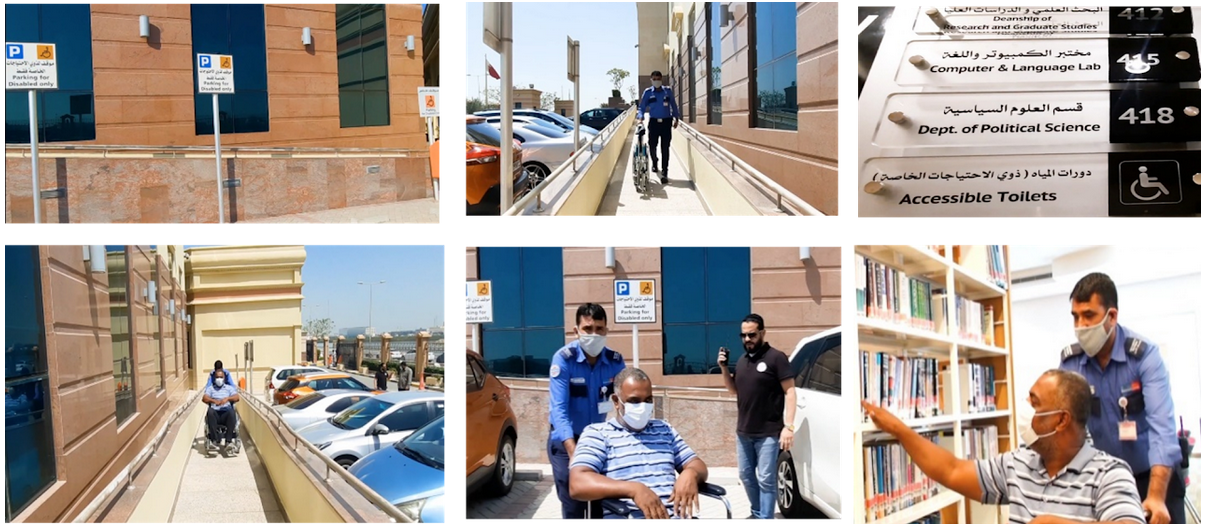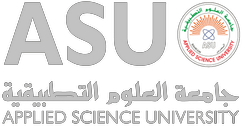
SDG 10.6.8
Disability Support Services
Disability Support Services at ASU
In addition to physical support, the university also provides academic support to students with disabilities as follows:
- Examination support – including different examinations halls, breaks between exams, increasing examination time, note taking, changing time and location, giving consideration in case of tardiness or absence.
- In class support – designing classes which can accommodate students with disabilities adequately, note taking, tutoring.
- Learning aids – learning aids such as visual aids, hearing aids, assistive devices. Accessible learning material on special screens is made available in the library for students with visual difficulties.
Finally, the university recognizes that students with disabilities may face additional financial burdens and may provide financial support in the form of grants, loans, scholarships, or waiving of certain fees to students with disabilities as a form of assistance. This will be at the sole discretion of the university management.
Counselling Office at ASU
The University places a high priority on student mental health and well-being, recognizing that students may face stress, anxiety, depression, or other mental health challenges during their academic journey. To address this, the University has established a Counselling Office within the Directorate of Student Affairs. This office provides one-on-one sessions with qualified professionals who offer emotional support and guidance to students struggling with mental health issues. These sessions are confidential and free of charge, ensuring that all students have access to the support they need without any financial burden.
This initiative aligns with SDG 10 by promoting reduced inequalities. By offering accessible mental health support, the University ensures that all students, regardless of their financial situation, can receive the help they need. This fosters an inclusive environment where every student has the opportunity to succeed and thrive.
Website link: https://www.asu.edu.bh/student-counselling-office/
Student Services Office
The Student Services Office under the Directorate of Student Affairs is responsible to provide non-academic support to students. The office helps improve the relationship between students and the administration of the university and to attend to the needs and concerns of students.
Website link: https://www.asu.edu.bh/student-affairs/student-services-office/
The University provides equal access to education for all students, including those from underrepresented groups such as students with special needs. The University recognizes the unique challenges that students with disabilities face when pursuing higher education and it provides reasonable accommodations to ensure that these students have the same opportunities to succeed as their peers.
To this end, the University has developed a policy titled with Policy for “Students with Special Needs/ Disabilities” outlining its commitment to providing support and assistance to students with disabilities.
This policy statement includes the following key points:
The University will aim to make all reasonable accommodations for students with disabilities: This means that the University will work to provide necessary accommodations to students with disabilities to ensure that they have equal access to education. Accommodation may include, but are not limited to, providing assistive technology, modified course materials, and accessible facilities.
The University will have dedicated and qualified staff to handle issues pertaining to students with disabilities: The University recognizes that students with disabilities may have unique needs and challenges and is committed to providing dedicated staff who are trained to handle these issues. These staff members will work closely with students with disabilities to provide support and guidance throughout their time at the university.
The University will provide full assistance to students with disabilities in order to make the student’s transition to University smooth, without duress and inclusive: The University is committed to providing full assistance to students with disabilities to ensure that the transition to University is as smooth as possible. This may include providing orientation programs, academic advising, and other support services to help students with disabilities succeed academically and socially.
In addition to the policy statement, the University has outlined the key responsibilities of various stakeholders in ensuring that students with disabilities receive the necessary support and accommodations to succeed academically and personally. These key responsibilities include:
Student Services
Student Counselling
Provide counselling and guidance to staff and students regarding students with disabilities.
Monitor the progression of students with disabilities and ensure that they are making sufficient academic progress.
Academic Staff
As Academic Advisors, all academic members of staff who are advising a students including those with special needs.
In addition to the previous key responsibilities, the university also provides physical support for ease of access. This includes:
Car Park: The University provides, where possible, special car parking slots for disabled students and students with special needs in close proximity to the entrance.
Bathrooms: The University provides suitable bathrooms for disabled students and students with special needs.
Entrances: The University provides suitable ramps on entrances as well as railings and elevator services (where appropriate) for disabled students and students with special needs.
Classrooms: Where needed, especially designed seating facilities in classrooms and labs are provided.
Health Clinic: The University ensures that the health clinic is properly staffed and accessible at all times.
Counseling: The University provides counseling services to students with disabilities on a regular basis and strives to meet all learning requirements of the students and ensure that the students feel properly accommodated within university premises.
In addition to physical support, the university also provides academic support to students with disabilities. This includes:
Examination support – including different examination halls, breaks between exams, increasing examination time, note taking, changing time and location, and giving due consideration in case of tardiness or absence.
In-class support – designing classes which can accommodate students with disabilities adequately, note taking, and tutoring.
Learning aids such as visual aids, hearing aids, and assistive devices.
Finally, the university recognizes that students with disabilities may face additional financial burdens and may provide financial support in the form of grants, loans, scholarships, or waiving of certain fees to students with disabilities as a form of assistance. This will be at the sole discretion of the university management.

